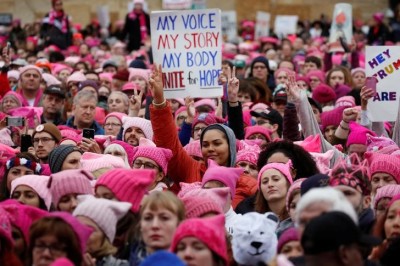Unplanned, Planned Parenthood and women’s rights

In March we celebrate International Women’s Day.
Their theme for this year stated, “A balanced world is a better world. How can you help forge a more gender-balanced world? Celebrate women's achievement. Raise awareness against bias. Take action for equality.”
We celebrate the value of all life. But we are also aware of a major bias in our culture that claims that abortion is more empowering to women than life-affirming options. Planned Parenthood stated in their 2018 year-end report that their “fight (is) to build a world of equality and opportunity for all.” Do they?
There are an estimated 200 million fewer women in the world today due to gender selective abortions. Baby girls are targeted for termination simply because certain cultures deem them less desirable than baby boys. So, as we think of the respect and value of women, we need to discuss the very real injustice of abortion. We need to recognize the heartache and pain of the estimated half billion women who had abortions in the last 10 years worldwide.
Abortion was dubbed the leading cause of death in 2018 according to Worldometers' count on December 31, 2018. Breitbart analyzed the stats and explained, “There were more deaths from abortion in 2018 than all deaths from cancer, malaria, HIV/AIDS, smoking, alcohol, and traffic accidents combined.”
Reproductive rights activists claim to promote freedom for women. They ultimately assume that a pregnancy will hinder future success. The insinuation is that if a woman wishes to excel in life, she should not become a mother. Planned Parenthood is making billions off these assumptions. In fact, they create their own demand by sponsoring events like “sex week” on college campuses. As soon as a student realizes she’s pregnant, she immediately knows where to go to take care of her problem.
When a woman has an abortion, she rarely, if ever, receives additional support or care from Planned Parenthood. Most often abortions take place during the first trimester. The abortion pill (RU486) is available through Planned Parenthood’s telemedicine in 13 states and at most Planned Parenthood clinics. After acquiring the abortion pill, a woman is told to go somewhere comfortable and get ready for a lot of bleeding. She’s often left to suffer the pain alone and encouraged not to call 911 but call a special number provided by the abortion facility if she starts to worry.
A depiction of what an RU486 induced abortion is like can be witnessed in the movie UNPLANNED, scheduled for release in 1,000 theaters on March 29, 2019. This is the true story of Abby Johnson who had two abortions, one chemical and the other surgical. She later became an executive director of a Planned Parenthood in Texas where she believed she was helping women every day. After witnessing an ultrasound guided abortion, however, she walked away from her job, never to return.
What she saw changed everything.
The UNPLANNED movie exposes what happens within the walls of abortion clinics across the country. With a front of women’s empowerment and equality, Planned Parenthood is one of the largest contributors to women’s oppression by making abortion seem like the best and most logical option. The abortion industry in America is a multibillion-dollar business prioritizing increase in cash flow rather than what truly is best for the women they counsel.
In contrast to abortion clinics, pregnancy care centers across the nation offer completely free services to any woman who needs them. Nurses and social workers listen to the woman’s concerns and work to connect the client to local resources that will meet their needs. From housing, transportation, job opportunities, parenting classes and more, pregnancy centers will walk alongside a woman through her pregnancy and up to two years after the birth of her child to ensure she knows she’s not alone.
We are honored to be a voice for those who cannot speak for themselves. Join us on March 29th at theaters across the country to learn more about how the abortion industry is completely going against what we celebrated on International Women’s Day. Stand with us to fight the injustice of abortion and love the women who feel like it’s their only option.




















